I’m here at Content Marketing World in Cleveland tonight. Actually, that’s not true. I’m more than an hour outside of Cleveland at some rundown, roadside motel, having been bussed here by the hotel I was supposed to be staying at tonight, the Westin Cleveland Downtown.
You know, as a hotel, your core brand promise is pretty simple. Someone books a room. You give them a room. Sure, there are other finer points of expectations, but they’re icing on the cake.
So while I’m far away from the joyous evening events of Content Marketing World tonight, I find myself reflecting on a more fundamental truth of modern marketing communications: you shouldn’t lie to your customers. At least not if you want to keep them.
Here are five lies that Westin told me:
#1. You’re reserved a room, guaranteed. The confirmation email had the headline: “Rest easy. Your reservation has been confirmed.” Well, I shouldn’t have rested easy, because when I arrived at the Westin after 18 hours of traveling from London, I was summarily told that they didn’t have a room for me. And not just me, they were quick to assure me — something like 30 other people with reservations were being turned away too. Jilted customers love company?
#2. You’ve prepaid for a room. But wait, I said. This was a prepaid room. I started to dig out the email that said my credit card was being charged $219.00 more than a month ago. The email said it was non-refundable and non-changeable. The man behind the desk look confused and was uninterested in looking at the printout of the email I had with me. Instead, he said they would refund me. (So much for the unqualified non-changeable and non-refundable rhetoric of the email.)
#3. We only charged you $2.19, not $219, because our computer cuts off the zeros. Good news, the guy behind the desk says. It turns out my card wasn’t charged $219 after all. It was only charged $2.19 because their computer must have cut off the zeroes. I swear I’m not making this up. Here’s a photo of the paper where the guy actually wrote out the math, how I should have been charged 100% but was, in fact, only charged 1%. (Another manager later told me they had only authorized $2.19, not charged it — so any charge was a lie. But the “computer cuts off zeroes” in billing excuse sounds pretty suspicious too; the CFO might want to look into that.)
#4. There will be a shuttle to take you to an alternate hotel in 5 minutes. I waited, with another speaker who had also been turned down for his “guaranteed” room reservation, for 45 minutes. No bus. I’m exhausted and starving. I finally gave up and went out to dinner. I tried a plea to the @Westin account on Twitter. But in the end, they only routed me back to the managers in Cleveland (who, by the way, did not call me, @Westin — I had to go back to the hotel to track them down — let’s call that lie #4.5).
By the way, Westin, when you’re breaking promises to so many people that you need a bus for all of them, that should be a catalyst for maybe reflecting on the course your life has taken.
#5. The alternate hotel is only 25 minutes away. In fairness, they said that it may take 45 minutes in rush hour traffic. But I waited out rush hour over dinner. When I resigned myself to this alternate hotel as my only option, there was no traffic at all, but it took over an hour to get here. And, not to be mean to this other hotel, but it’s kind of a dump. (Lie #5.5 was when the guy at the Westin had assured me how great of a hotel it was.)
So, instead of a “Heavenly Bed” as I was repeatedly promised on the web and in multiple email confirmations from Westin, I got a Hellish Experience instead.
As for you, dear reader, I apologize for going “off topic” with this rant. But I would bring it back to a relevant theme by simply making this point: it doesn’t matter what your website, your email, or your social media engagement says if, at the end of the day, you just fail to deliver what you promise.
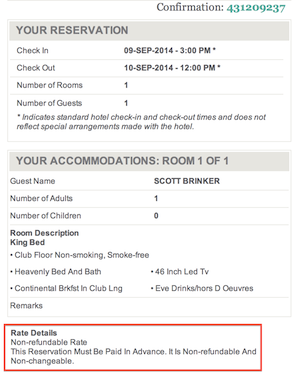
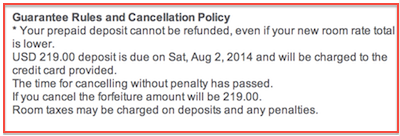
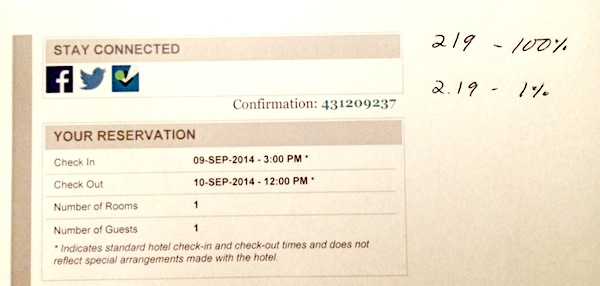
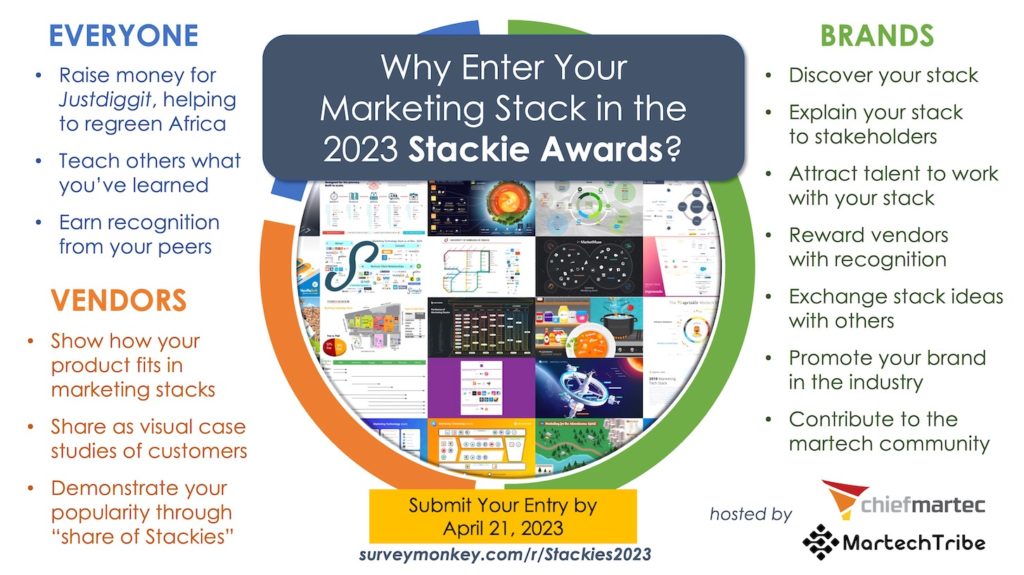

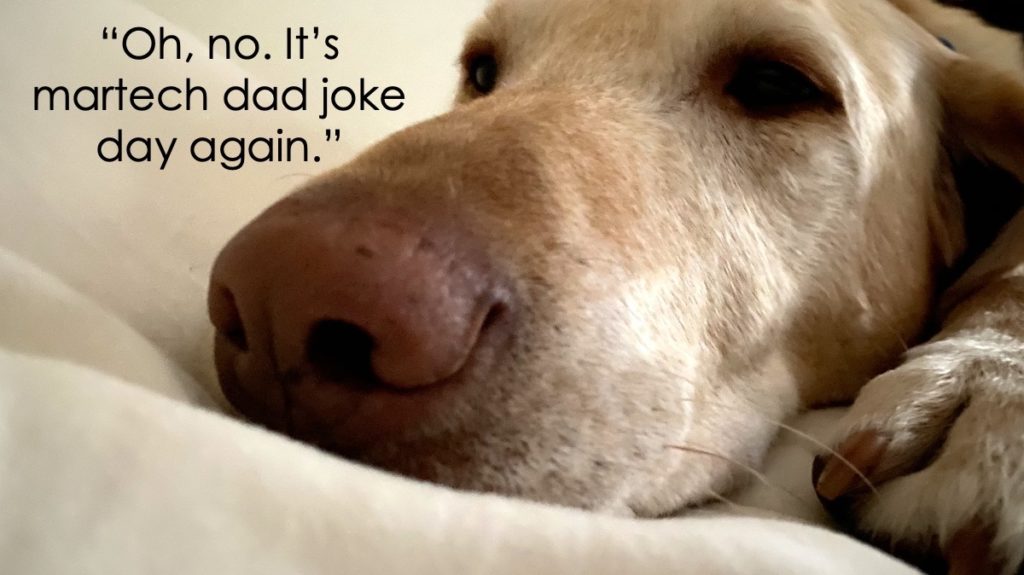
Le sigh. Sorry you had a bad experience at the Westin, and it does sound pretty bad, but looking at the bigger picture here: how many more articles about digital marketers being upset by their hotels and airlines do we have to suffer through? What do we learn from these articles? We’d all love to provide seamless customer experiences at our jobs, the kinds of experiences that get blogged about for being amazing, but under real world constraints that’s not always possible. Experiencing inconveniences due to poor customer service is never fun, but as they say, “attitude is what turns an ordeal into an adventure.” This isn’t a learning experience for marketers, it’s just marketing bloggers using their reach as a platform to gripe about bad service in the travel industry. It’s a tired subject at this point.
Thanks for the sympathies, Katherine.
I think you’re right to focus on the bigger picture. However, I believe the bigger picture is marketing and customer service are truly connected at the hip in today’s world — yet we still have a long way to go before that is operationalized at scale in most companies. In that bigger picture, I felt there were two reasons to write this.
First, search and social feedback from customers has been one of the few signals that causes companies to actually fix bad practices or reinforce good ones. But that only works if participants in the market provide that signal. If we all just suck it up in silence, it’s like turning off the TV to make the bad news go away.
Second, I don’t believe this was an accident or a one-off case of poor customer service. You’re right, mistakes happen, and nobody’s perfect. But based on what the manager at the hotel told me, and what I’ve now heard from others, this practice of “overbooking” is not uncommon. It’s an explicit choice the hotel made to risk reneging on an agreement with a customer to possibly squeeze out a few extra bucks in their yield management algorithm.
I think that’s wrong — and it’s an example of how technology designed to optimize a business can actually harm it instead. As so many people champion the power of “predictive analytics,” I think it’s important to recognize the dangers that can have when mixed with customer experience. I don’t think that’s a risk that’s been widely acknowledged yet as a “tired subject.”
I’ve written exactly one complaint like this in 7 years of blogging here, so this isn’t exactly my shtick every time I encounter some minor slight. It’s up to each reader though to decide if this is signal or noise.
Hi Scott
I totally agree with you when I think like a customer or even like a digital marketer.
As a normal customer I should respond to a series of bad customer service in a normal way. I should share my story using my social channels as anyone else will do.
As a digital marketer with bigger social reach I should be more vocal about such issues than a normal customer. With all these social monitoring tools what are the chances that a frustrated customer with LOWER reach will be heard? possibly close to 0%. Hence I think it is a a social responsibility for high reach users like you to shake some trees in the customer servicing departments where customer is not the #1 priority.
We should not suck it up in silence!
Course of action, Scott:
1) Realizing you’re dealing with a front desk knucklehead, you document everything.
2) Immediately thereafter, you download Hotel Tonight and pick up a new room.
3) Jump in a cab, go to the hotel, get a receipt from cabbie.
4) Have a few adult beverages.
5) Reach out to customer service the following day, make your case for having your cab ride and hotel room reimbursed by said hotel. Expect nothing in return.
6) Come to the realization that the hotel in question is operating with fewer brain cells than normally required. There’s nothing you can do about organizational idiocy, and that you can’t rationalize with an idiot.
Some good, practical advice, Joe — thanks.
One note I’ll make though: I think the blame for this falls on whoever authorized the algorithm to overbook the hotel. I don’t know if that was done by the Westin Cleveland, or since I booked online, by some other entity higher up in Westin Corporate.
I actually feel sorry for the folks at the front-desk. They had to deal with 30 angry people whom their employer had callously mistreated. They tried their best. The person who actually deserves the heat for this — is there a VP of Yield Optimization? — was far away from this strife, possibly just sipping a cup of tea, and congratulating themselves on statistically squeezing out an extra 0.000019% of revenue. When the probabilities failed, such as a “black swan” of a major event, they left the customer service people out to dry.
Have to respond back Scott…
The Vice Dingus of Yield Optimization made you a victim of that extra iota of revenue. However, it could’ve been completely rectified at the local level, and that’s why I lay the blame there.
What should’ve happened: a thousand mea culpas, rooms secured and comped at competing hotels, an individual cab ride to that hotel, a discount at a future stay at a Starwood-managed property, and a letter of apology. The Vice Dingus’ budget gets hit with that cost.
Someone correct me if I’m wrong, but I believe the Westin properties are franchise-owned, so this error in local judgement is at the hands of the property owner. Somehow, someway Starwood Vice Dingus will pay for the overbooking, but the loop needs to be closed with the local property owner.
I think they tried some of that. Unfortunately, all the competing hotels seemed booked as well (which I had multiple independent confirmations of that being the case). If this was a probabilistic risk they took, they hit a black swan.
It would be useful to learn if the Westin Cleveland Downtown is a franchise — would help shed light on who authorized the overbooking.
I’m very interested in learning what the algorithm was. Something like 105% of capacity? A more complicated heuristic? Something predictive? I could take guesses, but the real answers would be so much more helpful.
As Peter Drucker said, “the computer is a moron.”
Algorithms are brilliant, beautiful, and dangerous as hell.
What? No references in the comments to the Seinfeld episode where Jerry said “You see, you know how to *take* the reservation, you just don’t know how to *hold* the reservation. And that’s really the most important part of the reservation: the holding. Anybody can just take them.” As someone who stays in hotels 50-75 nights per year….I feel your pain.
Ah, the genius of Jerry Seinfeld. 🙂
Thanks, Jim.
Very descriptive blog, I loved that a lot.
Great example of setting expectations and not meeting them. I’m with you Scott that this isn’t a “mistake” but a calculated risk they took. They unfortunately The Westin lost on this one thanks to the power social media has given back to you as a customer. Hopefully there is a note now in your SPG account not to gamble with your reservations in the future :). Thanks for all the great information you share every day. Dave
Thanks, Dave.
I’d really like to learn a little more about just how much “gambling” like this goes on, who authorizes those gambles, and what algorithms they employ. I’m curious how much the cost-benefit analysis for that can be shifted by highlighting the potential brand risks.
Scott
I have stayed in a ton of hotels and the Starwood brand is one of the best and I have enjoyed Platinum status but I worked in a Hotel and have enabled Hotels with technology to improve the customer experience, but this is just wrong. For whatever reason the franchiser handled this totally wrong because many hotels have rooms available and they are not on the board because maybe the carpet is soiled. They could have given you that room. Also there is a lot of junior front desk staff that has no training or any clue about the travel experience. You fly across the country in a metal coffin tube and arrive after all the stress at a hotel to be told “sorry your room is no longer available and its not $2”. Things happen every day and companies keep customers by how they handle complaints and problems. The hotel could have done better.
They could have just put you in a competitors hotel across the street for the night and figured it out the next day. That is how the Four Seasons would have handled it if that happened to them.
I would complain to head office and I am sure they will give you a free night.
Major mistakes all around for Westin. Who knows if you’ll ever get the truth. Could be a combination of the online system and the local hotel management. The 1% charge story is insulting even if true. And really, all of the 3+ to 4 star accommodations were taken in Cleveland in September? Was there no alternate Starwood Group property? please follow up this story with any formal reply from Westin.
h/t to the comments on the algorithms, it’s one of the risks of trusting one’s business and brand to automation. Katherine mentioned this subject is tired, everyone has these kinds of stories — and she’s right. You’re right to publish this, to question the brand, TPTB who’s making these kinds of mistakes, who’s mismanaging expectations and customer service. btw think it was Zite’s algorithm that led me here, so there’s that too 🙂
“it doesn’t matter what your website, your email, or your social media engagement says if, at the end of the day, you just fail to deliver what you promise.” THIS! This sentiment I’ve been writing about forever as I tell clients or potential employers that the goal shouldn’t be to fix the review sites or Facebook page, it’s to fix the Brand, the Company.
Alas Scott, that doesn’t always matter. With exceptions, some brands don’t have to go those extra miles, they don’t have to make good on their promises. A big box store tweets something bad or sells something people don’t like.. and yet, they’re still selling and turning a profit. These stories are common in travel, yet no one stops going places. Someone like me reads a post like this but next time I have to book a room, if a Westin gives me the best deal on Priceline.. then that’s where I’ll stay. It’s what I’m considering marketing, crisis, or PR ‘proof’ – and that kind of complacency, it’s also very dangerous. FWIW.